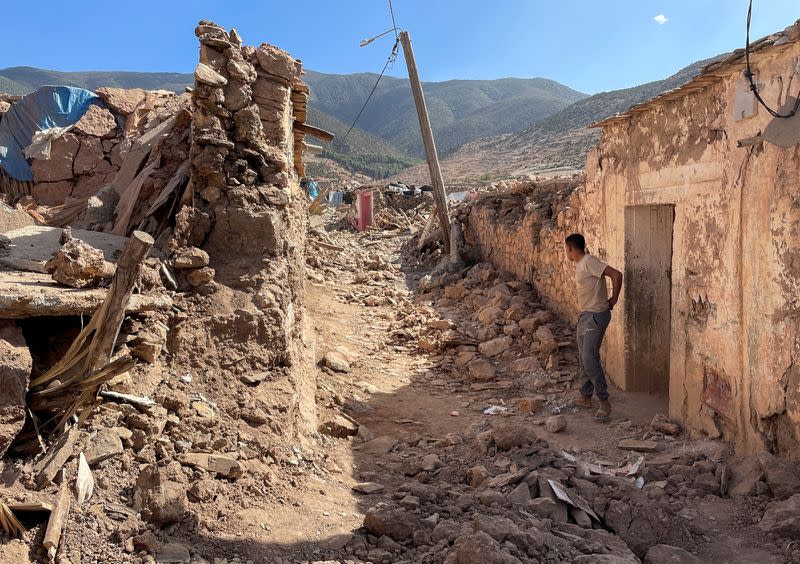Morocco earthquake killed young boy as family sat at dinner table
By Ahmed Eljechtimi
TAFEGHAGHTE, Morocco (Reuters) - Hamid ben Henna had just asked his young son Marouane to fetch a knife to cut a melon for the family's evening meal when Morocco's earthquake hit on Friday night.
With the weekend beginning, they had been enjoying a lamb and vegetable tagine stew and Marouane had been telling his father what materials he would need for the coming school year.
"That's when it struck," Ben Henna said. The room began to shake, the lights went out and rubble started falling from the ceiling of their traditional house in a remote village of the High Atlas mountains.
The earthquake was Morocco's most powerful since at least 1900 and it killed more than 2,000 people, mostly in small mountain villages like Tafeghaghte where the Ben Henna family live.
Ben Henna and his other son, Mouad, staggered out of the open door into the alleyway as their house began to collapse. They managed to free his wife Amina and small daughter Meryem. But as the dust settled they saw that Marouane had not made it.
The eight-year-old had run further into the house and was lying under a meter of rubble.
His little body was only recovered the next day, after Ben Henna's brothers arrived by car from Casablanca, five hours away, to help lift the rubble.
Marouane, described by his father as an enthusiastic boy who loved school, was buried on Saturday morning.
DESTITUTION
The family is now not only grieving but destitute. All their belongings lie in the wreckage of their fallen house and they face a third night sleeping outside in the bitter mountain cold.
Ben Henna's source of livelihood, the three-wheel moped he used to ferry goods around the neighbourhood for a small fee, was buried in falling debris and no longer works. The alleyway leading to the ruins of their house is covered in fallen rocks.
The family still have a donkey and a goat that survived the quake. But their animal feed was buried in a collapsed storeroom and there is little point slaughtering the animals because they cannot refrigerate the meat.
Barely a house in Tafeghaghte seems unscathed by the disaster. Of the roughly 400 villagers, nearly 80 are dead, according to survivors. Large piles of rubble dot the village. One family Ben Henna knew lost seven members.
Families have gathered under olive trees in a small field to pitch shelters where survivors can spend the night, safe from aftershocks even if their damaged homes stayed mostly erect.
Fatima Boujdig sat with her husband in the shade of their large red truck, badly damaged by falling rubble, as a donkey grazed nearby. They borrowed money to buy the truck and do not know how they can now repay it.
"We were in darkness and covered in dust. We heard the earthquake and the rocks and walls falling... now you can see the village is reduced to rubble," she said.
(Reporting by Ahmed El Jechtimi and Omer Berberoglu; Writing by Angus McDowall; Editing by Christina Fincher)




